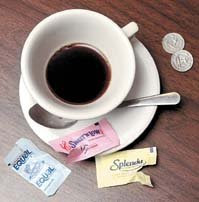
So just how much money is there in the world of artificial sweeteners? Try $1.5 billion a year.
And that's enough for Merisant, the makers of the aspartame-based sweetener Equal, to square off in court next week against McNeil Nutritionals, makers of sucralose-based Splenda.
The folks at Merisant are naturally concerned--fake sugar is big business. And since Splenda came on the scene back in 1999, Equal sales have fallen like a stone. Once in more than 6,000 consumer products and top of the artificial sweetener heap, Equal has tanked. Splenda now makes up 62 percent of the market in the US.
The thing Merisant has hung its legal hat on is McNeil's claim than Splenda is "made from sugar so it tastes like sugar." There is a big battle now over syntax and implied meaning in language, which a dorky editor-type like myself would salivate over even if products I consume weren't involved.
Does "made from sugar" imply that Splenda is actually sugar in some altered form? Merisant says so, and that sucralose is manufactured in a lab, not a cane field. McNeil simply says it says what it says (got that?)--that sucrose is involved early in the manufacturing process but anything resembling sucrose evaporates and is gone early on. Plus, Morisant contends, Splenda doesn't necessarily even begin with cane sugar--McNeil has filed dozens of patents on ways to manufacture sucralose. One of those ways involves sugar, but others are based on things like raffinose, a sugar cousin found in onions and broccoli, or other things completely unrelated to sugar.
As personally interesting as I find this case, I don't buy Merisant's implied contention that McNeil/Splenda has cornered the market because they've fooled consumers into thinking they're eating a more "natural" product than aspartame/Equal.
I think it boils down to taste--Splenda tastes better to me--and safety concerns over aspartame. As long as we had no readily available options, we ate Equal. Once another option became available, we switched. Simple as that.
How safe is Splenda? Well, I'm old enough to remember the cancer scare over saccharin, which kind of turned out to be an unsustainable charge, and the sweetener bogeyman is currently wailing on aspartame. I have no doubts sucralose will have its day in the questionable-health-value spotlight.
Meanwhile, I have switched to Splenda for most of my artificial sweetener needs, though I still prefer plain old aspartame-riddled Diet Coke to the citrus-tasting Splenda version, and I use saccharin-based Sweet & Low in my iced tea.
So whatever they all cause, I'll get it.
Lưu trữ Blog
-
▼
2007
(1403)
-
▼
tháng 4
(128)
- Behind the Mask
- Shaking Things Up
- Someone, Please, Staple My Camera to Me.
- Bumblefuck, WI
- RIAA claims rights to all artists' royalties
- Playlist - 28th April 2007
- Mountain Gorillas: Census shows increase in popul...
- SwapTree and The Year of the Gorilla
- Mountain Gorillas: Dian Fossey Field News
- Pass the Conservative Climate Change Plan
- HJA Hofland
- Political Knowledge. How Do You Rank?
- Cancer Cautions
- Komodo Dragon on the prowl (Video)
- Expansion drive
- I wanna be well
- Conscious Earth Receives Thinking Blogger Award
- Self
- Fantastically Profound CG Animation
- The Plastic Diet
- Will Sing For Food
- Ryan Vs. Dorkman 2
- Bye Bye Bad Bulbs?......Great Idea!
- Schwarzenegger Welcomes BC to Carbon Trading Market
- C2C versus CO2
- Preview of my Cf.Objective() Talk
- Junkfood Science
- Tories Vote for Hard Caps on Emissions,...Accident...
- The Birds and the .......
- Are We There Yet?
- Mountain Gorillas: Rwanda Reborn
- Endangered animals on the EDGE
- Global Warming Gaffe
- Mister Helpdesk
- Toysrevil interview
- Blah Blah Blah
- Hip Shooter
- Doctor Who: The Last Dodo
- April 22nd, 2007
- Thomas Hildenbrandt at work
- dutch woman
- Playlist - 21st April 2007
- Dave Katz / Lee Perry Shows
- Ninja Turtle Scam
- The whiskey didn't kill the pain
- Season's Greetings!
- Mountain Gorillas: Video of newborn baby
- Reflection principle
- Saving Chocolate
- The Eye Bone's Connected to the Brain Bone.
- Dying to be Thin
- Proud to be a Southerner
- EA's Direct Download FTP Site
- Behind on posting... again
- The Coach Blog: Season 2
- Finding My Way
- Rails
- Wedding invitation
- T99
- Louis Paul Boon
- Vonne van der Meer
- Dutch inventions
- 1 Sheep 2 sheep 3 sheep
- EPA Spin Praises Bush
- All or Nothing
- Stephen Fry: Last Chance To See "not quite there yet"
- Little white lies...
- US Cuts Lead in Toys
- History Is Made: Two Posts In One Day
- AI: Artificial Insanity
- An Inconvenient Truth for BC High Schools
- Zoo Quest For a Dragon online soon?
- Completely Useless Info
- How about some Buffet
- Visual Encouragement
- Playlist - 14th April 2007 - Funkology
- A Slippery Slope
- Dion and May Join Efforts to Defeat Mackay
- Good News for Whales (I Think)
- Thicker Than Water
- AHA Tackles "Bad Fat"
- Stephen Fry: Last Chance To See TV series Official...
- Stephen Fry: Last Chance To See TV series CONFIRMED!
- Fifth Douglas Adams Memorial Lecture - Video Report
- Penguins and Penis Rock
- GM - Brown Suits, Green Image
- Product Report--New in April
- Easter Pics
- Holding Room
- Help Put An Inconvenient Truth in Every High School
- How To Meet Kyoto? Live Like a New Yorker
- Fat: What No One Is Telling You
- At Random: Sugar Free
- Are we getting too spoiled?
- Don Merton devastated by threat of stoat
- A Radical Plan to Save the Tasmanian Devil
- A Dose of "Truth" for Every Canadian High School
- Bienvenue and Bon Appetit
- State of Mind
- Komodo Dragon Video Nasties?
-
▼
tháng 4
(128)